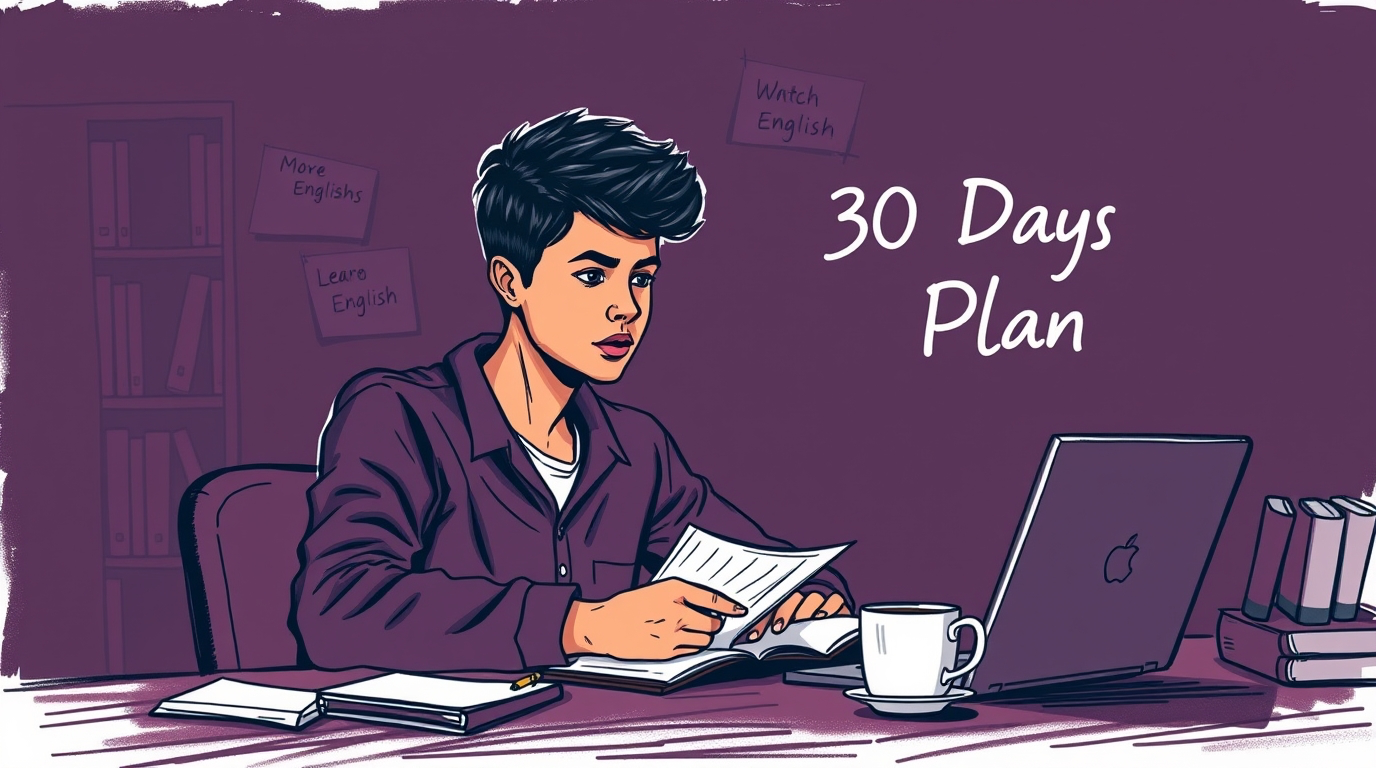Introduction
Learning English can feel hard, but don’t worry! With this 30-day plan, you will practice a little every day. Each day has easy and fun tasks to help you improve your reading, writing, speaking, and listening skills. You will learn useful words, practice grammar, and feel more confident using English in real life.
This plan is for A1 learners (beginners), so everything is simple and clear. You don’t need many books or tools—just your time and effort. Follow this plan step by step, and in 30 days, you will see great progress! Let’s start your English learning journey today!
Week 1: Building a Foundation
In the first week, we will start with very simple steps. You will learn basic grammar, new words, and practice listening, speaking, and reading. By the end of this week, you will feel more confident in using English for everyday situations.
Day 1: Know Your Starting Point
Before learning, it’s good to know where you are.
1. Think About Your English Skills:
• Can you say your name in English?
• Do you know how to say hello, goodbye, or thank you?
• Write down what you know and what you want to learn.
2. Set Small Goals:
• Example: “I will learn 10 new words today.”
• Example: “I will speak one sentence in English every day.”
3. Prepare Your Notebook:
• Write “Day 1” at the top. Write your goals for the day.
Activity: Write one sentence about yourself in English. Example: “My name is Ali.”
Day 2: Learn Basic Grammar
Grammar helps you put words together. Start with very simple rules.
1. Sentence Structure:
• Learn this order: Subject + Verb + Object.
• Example: “I eat rice.”
• Subject = I, Verb = eat, Object = rice.
2.. Learn “Be” Verbs:
• Present Simple:
• I am happy.
• You are my friend.
• It is a cat.
3. Practice Speaking:
• Say these sentences out loud:
• I am a student.
• You are my teacher.
• It is my book.
4.. Write 3 Sentences:
• Write about yourself using “am” or “is.”
Activity: Write and say this sentence: “I am learning English.”
Day 3: Learn New Words
Vocabulary helps you talk about your life. Today, you will learn 10 new words.
1. Pick Easy Words:
• Family: father, mother, brother, sister.
• Food: apple, bread, milk, rice.
• Common Verbs: eat, sleep, walk.
2. Write Them Down:
• Write the words in your notebook. Write one example:
• Father: My father is kind.
• Apple: I eat an apple.
3. Say the Words:
• Practice saying each word 5 times.
4. Use Flashcards:
• Draw pictures of the words or use an app like Quizlet.
Activity: Write 3 sentences with your new words. Example: “I eat rice with my mother.”
Day 4: Practice Listening
Listening to English is very important. It helps you understand sounds and words.
1. Find Easy Audio:
• Listen to beginner podcasts, like “The English We Speak.”
• Watch simple YouTube videos for A1 learners.
2. Listen and Repeat:
• Listen to a short sentence and repeat it.
• Example: “Hello, how are you?”
3. Watch with Subtitles:
• Turn on subtitles in English. Look at the words as you listen.
4.. Write What You Hear:
• Write one or two words that you hear.
Activity: Listen to a video about greetings. Write down one greeting (e.g., “Good morning!”).
Day 5: Practice Speaking
Speaking is how you use English. Today, you will speak small sentences.
1. Say Hello and Goodbye:
• Practice these:
• Hello!
• How are you?
• Goodbye!
2. Talk About Yourself:
• Say:
• My name is [Your Name].
• I am from [Your Country].
• I like [Your Hobby].
3.. Record Your Voice:
• Use your phone to record your voice. Listen and try again.
4. Talk to Someone:
• If possible, say “Hello” or “How are you?” to a friend.
Activity: Record yourself saying, “My name is [Your Name], and I like [Your Hobby].”
Day 6: Practice Reading
Reading helps you learn more words and sentences.
1. Start with Short Texts:
• Read a simple story or a short paragraph.
• Example: “My name is Anna. I have a cat. My cat is white.”
2.. Underline New Words:
• Find 2-3 words you don’t know. Look them up in a dictionary.
3. Read Out Loud:
• Say the words while you read.
4. Write a Summary:
• Write 2 sentences about what you read.
Activity: Read a story about animals. Write: “The cat is black. It likes milk.”
Day 7: Review and Reflect
This is the last day of Week 1! Let’s look back at what you learned.
1. Review Your Notebook:
• Read the words and sentences you wrote.
2. Test Yourself:
• Can you say 5 sentences about yourself?
• Can you name 10 new words?
3.. Practice More:
• Repeat the activities you liked the most.
4. Set a Goal for Week 2:
• Example: “I will learn 15 new words next week.”
Activity: Write one paragraph about what you learned this week. Example:
“I learned 10 words. I can say ‘My name is Ali.’ I read a story about a cat. I feel happy!”
Week 2: Expanding Skills
In Week 2, we will build on what you learned in Week 1. You will expand your vocabulary, practice speaking longer sentences, listen to more conversations, and improve your writing. By the end of this week, you’ll feel more confident using English in daily life.
Day 8: Learn Daily Routine Vocabulary
Talking about your daily routine is an important skill in English. Today, you’ll learn common words and phrases for daily activities.
1. Learn Common Words:
• Wake up, brush, eat, drink, go to school/work, study, sleep.
2. Use the Words in Sentences:
• Example:
• I wake up at 7 a.m.
• I eat breakfast at 8 a.m.
3. Practice Speaking:
• Say your daily routine out loud.
• Example: “I wake up at 7 a.m., brush my teeth, and eat breakfast.”
4. Write Your Routine:
• Write 4-5 sentences about your day.
Activity: Write and say: “I wake up at 7 a.m. I go to school at 9 a.m. I eat lunch at 1 p.m.”
Day 9: Practice Listening with Everyday Conversations
Listening to simple conversations will help you understand real-life English.
1. Find Simple Audio or Videos:
• Listen to topics like shopping, greetings, or traveling.
• Websites like BBC Learning English or YouTube have beginner-friendly conversations.
2. Listen and Write:
• Write 2-3 words you hear, like “hello” or “coffee.”
3.. Repeat What You Hear:
• Pause the audio, and repeat the sentences slowly.
4.. Practice a Short Dialogue:
• Example:
• Person A: “Hello! How are you?”
• Person B: “I’m fine. How about you?”
Activity: Listen to a short shopping video. Write down 3 words, like “apple,” “buy,” or “store.”
Day 10: Learn 15 New Words About Places
Today, you will learn words for common places, like “home,” “school,” and “park.”
1. Learn Place Names:
• Home, school, park, store, hospital, library, bank, street, market.
2. Use Prepositions:
• Learn how to say where things are:
• Example: “The book is on the table.”
• Prepositions: on, in, under, near.
3.. Practice Writing Sentences:
• Example: “I go to the park.”
• “The store is near my house.”
4. Draw a Simple Map:
• Draw your house, a store, and a park. Write sentences about them.
Activity: Write and say: “My school is near my home.”
Day 11: Practice Reading a Short Story
Reading simple stories will help you learn new words and grammar.
1. Choose a Short Story:
• Read a beginner story like “The Cat and the Mouse” or any A1-level story.
2. Underline New Words:
• Find 3 new words and write them in your notebook.
3. Answer Simple Questions:
• Example:
• What is the story about?
• Who are the characters?
4.. Practice Reading Aloud:
• Read the story slowly. Focus on pronunciation.
Activity: Write a sentence about the story. Example: “The cat runs after the mouse.”
Day 12: Practice Speaking Longer Sentences
Today, we will practice speaking sentences with more detail.
1. Describe a Picture:
• Look at a simple picture of a park or a market.
• Say:
• “The park is big.”
• “There are trees and flowers.”
2. Talk About Your Family:
• Example:
• “I have a small family. My father is a teacher. My mother is a doctor.”
3. Ask and Answer Questions:
• Question: “What is your name?”
• Answer: “My name is Sara.”
4.. Record and Review:
• Record yourself speaking. Listen and improve.
Activity: Say 3 sentences about your family. Example: “I have one brother. His name is Ali. He is a student.”
Day 13: Practice Writing Sentences
Today, you will practice writing simple sentences and short paragraphs.
1. Write About Your Day:
• Write 5 sentences about what you did today.
• Example:
• “I woke up at 7 a.m. I ate breakfast. I went to school. I played football. I watched TV.”
2. Describe Your Room:
• Example:
• “My room is small. It has a bed, a table, and a chair.”
3. Practice Questions and Answers:
• Question: “Where do you live?”
• Answer: “I live in Pakistan.”
Activity: Write and say: “I live in a house. It is near a park.”
Day 14: Review and Reflect
You’ve finished Week 2! Let’s review what you learned.
1. Review Vocabulary:
• Can you say 15 new words about places?
2.. Practice Sentences:
• Say 5 sentences about your daily routine.
3. Revisit Activities:
• Listen to one audio or video again.
• Read one story again.
4. Set New Goals:
• Example: “Next week, I will learn 20 new words.”
Activity: Write one paragraph about your week. Example:
“This week, I learned new words about places. I can say sentences like, ‘The store is near my home.’ I read a story about a cat. I feel happy!”
Week 3: Building Confidence
In Week 3, we will focus on boosting your confidence with English. You will practice having small conversations, using new vocabulary, listening to real-life dialogues, and improving your fluency. By the end of this week, you’ll feel ready to use English in simple daily situations.
Day 15: Learn 20 New Action Words (Verbs)
Action words (verbs) help you describe activities. Today, we’ll focus on learning common verbs and using them in sentences.
1. Learn These Verbs:
• Eat, drink, play, walk, run, swim, study, write, read, jump, open, close, watch, listen, talk, buy, sell, cook, sleep, wake up.
2. Use Verbs in Sentences:
• Example:
• “I eat an apple.”
• “She plays football.”
3. Practice the Past Tense:
• Learn simple past forms:
• Eat → Ate, Drink → Drank, Walk → Walked.
• Example: “I ate breakfast.”
4. Write 5 Sentences:
• Example:
• “I drink water. I study English. I watch TV.”
Activity: Write and say: “Yesterday, I studied English and played football.”
Day 16: Practice Conversations at a Store
Imagine you are shopping at a store. Let’s practice useful phrases.
1. Learn Key Phrases:
• “How much is this?”
• “I want to buy apples.”
• “Do you have milk?”
• “Thank you.”
2. Listen to Shopping Dialogues:
• Find a short audio or video about shopping.
3. Practice a Dialogue:
• Person A: “Hello! How much is this?”
• Person B: “It’s $5.”
4. Role-Play with a Partner or Alone:
• Pretend you are in a store. Use the phrases you learned.
Activity: Say 3 sentences:
• “I want to buy milk.”
• “How much is it?”
• “Thank you.”
Day 17: Learn Words for Food and Drinks
Talking about food is a fun and useful skill!
1. Learn Common Words:
• Food: Bread, rice, chicken, fish, vegetables, fruits, apples, bananas, eggs.
• Drinks: Water, tea, coffee, milk, juice.
2. Practice Speaking:
• Example:
• “I like apples and rice.”
• “I drink tea in the morning.”
3.. Describe Your Favorite Food:
• Example:
• “My favorite food is pizza. It is delicious.”
4.. Write a Menu:
• Write a menu with 3 foods and 3 drinks.
Activity: Write and say: “I eat rice and chicken for lunch. I drink juice.”
Day 18: Practice Listening with Daily Activities
Today, you will focus on listening to simple daily activities.
1. Find Audio About Daily Life:
• Topics: Morning routines, going to school, cooking.
2. Write What You Hear:
• Write 3-5 words from the audio.
• Example: “Wake up, school, breakfast.”
3.. Repeat Sentences from the Audio:
• Example: “I wake up at 7 a.m. I eat breakfast at 8 a.m.”
4. Write 3 Sentences About Your Day:
• Example: “I study English. I play football. I watch TV.”
Activity: Listen to an audio and repeat 3 sentences you hear.
Day 19: Practice Writing a Paragraph
Writing a paragraph helps you express your thoughts clearly.
1. Write About Your Favorite Day:
• Example:
• “My favorite day is Sunday. I wake up late. I eat breakfast with my family. I play games and watch TV.”
2. Use Connecting Words:
• Learn: and, but, because, so.
• Example:
• “I like Sunday because I can relax.”
3. Write 5 Sentences About Your Routine:
• Example:
• “I wake up at 6 a.m. I eat breakfast. I go to school. I come home. I do my homework.”
4. Practice Reading Your Paragraph Aloud:
• Check your pronunciation.
Activity: Write and say: “I like Saturday because I can play with my friends.”
Day 20: Review Food and Shopping Words
Let’s review the words and phrases you learned this week.
1. Review Food Words:
• Can you say 5 foods and 5 drinks?
• Example: “Rice, chicken, apples, tea, coffee.”
2. Practice Shopping Phrases:
• Say: “How much is this? I want to buy milk.”
3. Listen to a Dialogue Again:
• Repeat the sentences you hear.
4.. Write a Short Story:
• Write 5 sentences about buying food.
• Example:
• “I go to the store. I buy apples. They are $3. I also buy milk. I feel happy.”
Activity: Say your short story aloud.
Week 4: Practical Usage and Daily Communication
In Week 4, you’ll apply what you’ve learned in real-world situations. The goal is to strengthen your speaking and writing skills through more practice. This week is all about making English a part of your daily routine.
Day 21: Practice Greetings and Introductions
You’ll learn how to start conversations confidently.
1. Learn Basic Greetings:
• “Hi, how are you?”
• “I’m fine, thank you. And you?”
• “Nice to meet you.”
2. Practice Introducing Yourself:
• Example:
• “My name is Ali. I am from Pakistan. I am learning English.”
3. Role-Play with a Partner or Alone:
• Pretend you meet someone new.
• Person A: “Hello! My name is Maria.”
• Person B: “Hi, Maria. My name is John.”
4. Write Your Own Introduction:
• Write 3-5 sentences about yourself.
• Example:
• “Hello! I am Sara. I am 20 years old. I like reading and learning English.”
Activity: Say your introduction aloud 3 times.
Day 22: Learn Words for the Weather
Talking about the weather is common in English. Let’s learn useful words and phrases.
1. Learn Weather Words:
• Sunny, rainy, cloudy, windy, cold, hot, warm, stormy.
2. Practice Sentences:
• Example:
• “It is sunny today.”
• “Yesterday, it was rainy.”
3. Ask and Answer Questions About Weather:
• “What is the weather like today?”
• “It is cloudy and cold.”
4. Write 5 Sentences About the Weather:
• Example:
• “Today is sunny. I like sunny days. Yesterday, it was rainy. I stayed at home. I don’t like rainy days.”
Activity: Practice asking and answering weather questions.
Day 23: Listen to Short Conversations
Listening is important for understanding English speakers.
1. Find Audio About Everyday Life:
• Topics: Weather, shopping, traveling.
2. Write Down What You Hear:
• Write 3 key words or sentences from the audio.
• Example:
• “It’s sunny. Let’s go to the park.”
3. Repeat Sentences from the Audio:
• Say them aloud to improve your pronunciation.
4.. Answer Questions About the Audio:
• Example:
• Q: “What is the weather like?”
• A: “It’s sunny.”
Activity: Listen to the audio 3 times and try to repeat it word for word.
Day 24: Practice Talking About Your Daily Routine
Let’s practice describing your daily activities.
1. Review Daily Routine Words:
• Wake up, eat breakfast, go to work/school, study, play, sleep.
2. Write About Your Day:
• Example:
• “I wake up at 6 a.m. I eat breakfast at 7 a.m. I go to school at 8 a.m.”
3. Use Time Words:
• Learn: morning, afternoon, evening, night.
• Example:
• “In the morning, I study. In the evening, I watch TV.”
4. Practice Speaking Aloud:
• Say:
• “I wake up at 6 a.m. In the evening, I play football.”
Activity: Write and say your routine for today and yesterday.
Day 25: Learn Travel Words and Phrases
Traveling is a great reason to learn English.
1. Learn Key Words:
• Airport, train, bus, ticket, hotel, luggage, passport.
2. Practice Asking Questions:
• “Where is the airport?”
• “How much is a bus ticket?”
• “Can I have a hotel room, please?”
3.. Role-Play a Travel Situation:
• Example:
• “Excuse me, where is the train station?”
• “It is over there.”
4. Write About a Trip:
• Example:
• “I go to the airport. I take a plane to London. I stay in a hotel.”
Activity: Pretend you are at an airport. Practice asking for help.
Day 26: Write a Simple Story
Writing stories helps you use new words and grammar.
1. Write About Your Weekend:
• Example:
• “On Saturday, I wake up at 8 a.m. I eat breakfast. I go to the park. I meet my friend. We play football. It is fun!”
2. Use Connecting Words:
• Learn: first, next, then, finally.
• Example:
• “First, I wake up. Next, I eat breakfast. Then, I go to the park. Finally, I go home.”
3. Practice Reading Your Story Aloud:
• Check your pronunciation.
4.. Ask Someone to Check Your Story:
• A friend or teacher can help.
Activity: Write a 5-sentence story about your weekend.
Day 27: Practice Asking for Directions
Let’s learn how to ask for and give directions.
1. Learn Key Phrases:
• “Where is the park?”
• “Go straight.”
• “Turn left.”
• “Turn right.”
• “It is near the school.”
2.. Practice a Dialogue:
• Person A: “Excuse me, where is the bank?”
• Person B: “Go straight and turn right. It is near the supermarket.”
3. Write Directions to a Place:
• Example:
• “Go straight. Turn left. It is on the right.”
4. Use Maps to Practice:
• Look at a map and describe how to get to a place.
Activity: Practice giving directions to a friend.
Day 28: Review All Topics
Today, you will review what you’ve learned in the past 4 weeks.
1. Review Vocabulary:
• Write 10 new words from each week.
2.. Practice Speaking:
• Say sentences about food, weather, and your daily routine.
3. Listen Again to Old Audio:
• Check if you understand it better.
4. Write a Short Story:
• Use all the new words you’ve learned.
Activity: Write and say: “I learned many new words. I can talk about food, weather, and shopping.”
Day 29: Practice with a Partner
Talking to someone helps you become more confident.
1. Have a Simple Conversation:
• Talk about food, weather, or daily routines.
2.. Ask and Answer Questions:
• Example:
• Q: “What do you eat for breakfast?”
• A: “I eat bread and drink tea.”
3. Role-Play a Real-Life Situation:
• Example: shopping, traveling, or asking for directions.
4. Write About Your Conversation:
• Example: “I talked to my friend. We talked about the weather and food.”
Activity: Speak for 5 minutes about your day.
Day 30: Celebrate Your Progress!
Congratulations! You’ve completed the 30-day plan.
1. Write About Your Experience:
• Example:
• “I learned many new words. I can speak about food and shopping. I feel confident.”
2. Make a Goal for Next Month:
• Example:
• “I want to learn 100 new words and read a book.”
3. Practice Speaking for 10 Minutes:
• Talk about your favorite topic.
4. Celebrate Your Achievement:
• Reward yourself for your hard work!
Activity: Write and say: “I finished the 30-day plan. I am proud of myself!”




